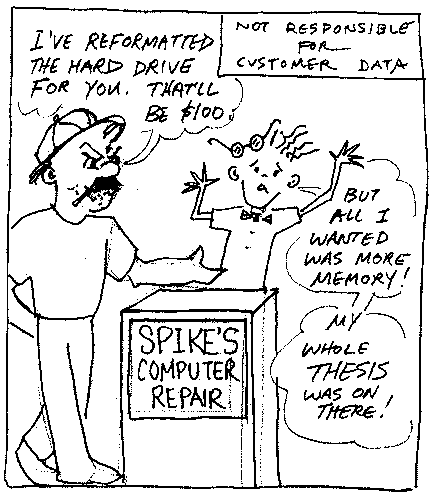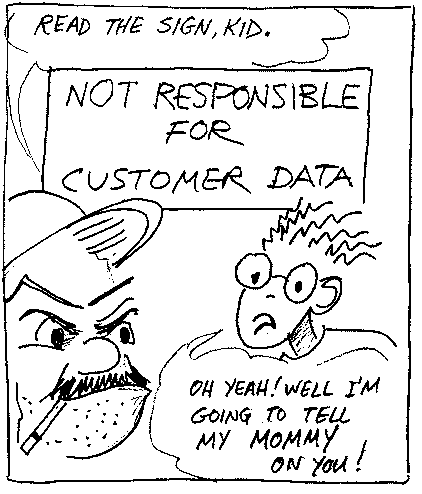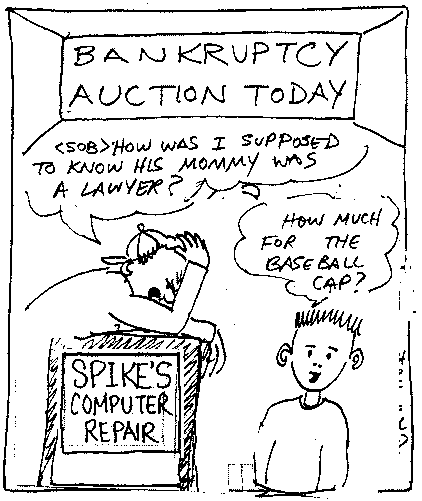Is there no pity sitting in the clouds
That sees into the bottom of my grief?
When Shakespeare's Juliet first uttered those lines, the greatest threats to data were hungry mice and chimney fires. Today we are all drowning in so much redundant information that the very notion of losing something valuable seems almost ridiculous. Yes, we all know somebody who never bothered backing up a manuscript in progress and lost it, or a business where they changed the backup tapes every night only to find that they couldn't restore their server when disaster finally struck. But cloud computing will save us all from bothersome data management tasks, or will it?
Before you start throwing away all of your computer hardware and start running your business on netbooks or thin clients plugged into the cloud, read the terms of service. What I've found, while normal for software services, would come as a shock to most publishers and other businesses accustomed to ironclad contract terms. For starters, the terms of service I read for Amazon and Google, the gold standards of cloud computing, reserve the right to change their terms at any time by posting an updated version. Depending on the services you are paying for, you may be given a few weeks grace period to adjust, but I wouldn't produce books in Microsoft Office if I thought Microsoft could show up at my door and demand I give it back.
The cloud promises high up-time, up to 99.9%. But what happens if your e-mail is unavailable when you have a deliverable deadline, or if the conferencing service chooses the hour of your big conference to take its yearly time off? The agreements I read indemnify you for the failure by giving you a few free days of service. That's nowhere near as satisfying (or effective) as calling your IT guy onto the carpet and explaining in measured tones that he has five minutes to make it work or he can start looking for another job. In recent weeks we've seen denial of service attacks hitting government entities and companies that somebody sees as worth the trouble of attacking - bigger isn't always better.
But the real threat I see in cloud computing is the moral hazard associated with outsourcing any critical tasks or record keeping. The manager who signs the agreement today will read it and be aware of the limitations, but those terms of service will change over the years, as will the manager. Ten years, twenty years down the road, when everybody in the organization is conditioned to treat the document and message archives of the cloud like Fort Knox, a Black Swan will rear it's lovely head and a bunch of people who preferred not to worry about the future will be left without a past. I call it the Rollerball moment for the central archive of the future that misplaced a century of human history.
As an option to temporarily expand the computing power of your organization for specific tasks without having to invest millions in new hardware and software, the cloud is an elegant solution. Whether it's an experiment in serving video or other bandwidth intensive content, the occasional data mining drive through your databases or a massive spidering effort on the web, cloud computing is the way to go. But if you find that your day-to-day business operations have become dependent on the availability of cloud services, you better get a stronger contract than "As Is, As Available", with no meaningful warranty or assumption of liability.
I don't question the ability of Amazon or Google to safely store data with a higher availability, on average, then the average business or individual. And whether you use a data warehousing service or regularly e-mail unfinished book manuscripts as attachments to your Google, Yahoo or Microsoft account, having offsite back-ups is critical for preserving your data. But you can't outsource your thinking and attention to detail and expect to survive beyond one business cycle. If you read between the lines of hype surrounding clouds and software as a service, you'll find that promise is the same old promise that's haunted us throughout the information age: "You do the strategic thinking, and we'll take care of the details." It's a great sales pitch, appealing as it does to human vanity, but it's a lot easier coming up with the names of companies that succeeded taking care of details than thinking strategically.




Backing up data is easy. Backing up the applications that work with that data is harder. I still fire up my ten year old laptop once or twice a year to use some old programs that don't run under modern versions of Windows. They aren't critical to my business, just convenient, and it sure beats being dependent on software as a service when the service provider decides to abandon support for earlier applications to better serve customers. That's my main complaint about working with Amazon and Google over the years. They make unilateral decisions to abandon support for this or that service, and there's no appeal. While a vendor may stop supporting software that you licensed and installed on your computer years before, in most cases, it will continue to work.
4 comments:
hi,
small steps i think are best. i've been using Syncplicity (don't work there, just like it a lot). there's a client that runs on your computer, and whenever(!) a file is changed in a given directory, it's immediately (2-3 seconds) backed up to the cloud. file is instantly backed up and safer. the cool part is i have my second computer "in synch" so that 10 seconds after the file is backed up in the cloud, it's duplicated down to computer #2. within 30 seconds of saving every version, i have three copies of my important files. that rocks!!!
thanks for the great writing. if you want to try syncplicity, email me and i'll send you an invite, which will give me a few GB more storage space.
cheers,
m
I completely agree with this article. I have a Laptop Repair and Computer Support Company in San Diego CA and have had a couple of corporate clients that have thought about "plugging into the cloud," but many of my clients are attorney's. Can you imagine if they are working on Google Docs, it goes down for maintenance, and a contract is due, they could lose millions of dollars. Make sure the T&C is read before using any SaaS and cloud services.
Great Post
- Jake
http://www.sdcomptech.com
San Diego Computer Techs
m,
I'm pretty mechanical about back-ups at this point. I use memory sticks, e-mail, and the occasional DVD recording. So thanks for the invite but I'll stand pat for now:-)
Morris
Jake,
I've already read some horror stories about freelancers who have missed deadlines (and payments) because they were utterly reliant on the cloud and couldn't get their work turned in on time. While I don't punch a clock for anybody, I recently picked up a cellular modem which gives me a back-up to DSL, and is handy for traveling.
Morris
Post a Comment